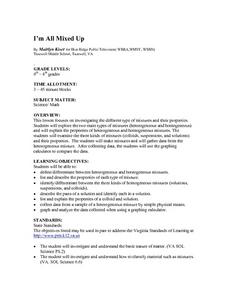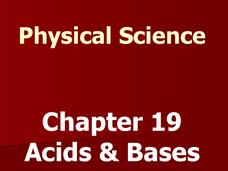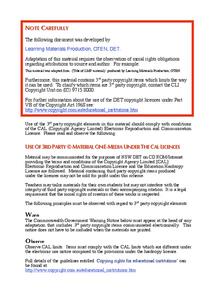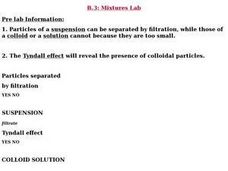Science Geek
Colloids and Suspensions
Examine the properties of colloids and suspensions. A slide show defines each mixture and explains their properties. Pupils learn to identify each mixture and compare them to solutions.
It's About Time
Solutions, Suspensions, and Colloids
Chemists are frequently in suspension, but not because they misbehave! Scholars mix various items with water to create solutions, suspensions, and colloids. They test each one to determine their differences and properties. The resource...
Curated OER
WS 8.7 Solutions, Colloids and Suspensions
In this solutions, suspensions and colloids activity, students use diagrams to show how particles are different in each of these mixtures. They also distinguish between characteristics of each of these types of mixtures and categorize...
Curated OER
Solutions, Suspensions, & Colloids Lab
In this solutions, suspension and colloid worksheet, students complete a lab experiment in order to determine if a given mixture is a solution, suspension or colloid. They are given six vials and they record their observations of each...
National Institute of Open Schooling
Colloids
Classes explore colloids through readings and questions in lesson 10 in a series of 36. They learn everything from methods of preparation and properties to how to classify colloids. They finish the lesson by seeing how to apply...
Curated OER
Chapter 12 Review, Section 1: Solutions
Here is a different approach to solutions: a worksheet that has chemistry learners use words to describe them! This is an outstanding exercise that will stretch learners to show what they know. They answer questions comparing solutions,...
Curated OER
Solutions, Suspensions, and Colloids
In this solutions, suspension, and colloids worksheet, students answer questions as it relates to their reading information about solutions, suspensions, and colloids. Students observe different examples and complete a chart as they...
Curated OER
I'm All Mixed Up
Middle school scientists compare and contrast heterogeneous and homogeneous mixtures. They differentiate solutions, colloids, and suspensions by examining samples of each. Note that the bulk of the lesson plan directs you how to...
Curated OER
Solutions
Amateur chemists define and describe properties of solutions, compare solubilities, explain how solutes affect freezing and boiling points, describe acid and base properties, and more! This educational PowerPoint provides information and...
Curated OER
Mixing in the Kitchen
Students identify the different types of mixtures. They identify examples of solutions, suspensions, colloidal dispersions, and emulsions through a game and basic experiments.
Curated OER
Solutions
In this solutions worksheet, students read about the characteristics that define a solution such as the solvent and the solute and the homogeneous mixture. They are given a chart with the differences between solution, colloids and...
Cornell University
Nano Interactions
Tiny particles can provide big learning opportunities! Middle school scientists explore the world of nanoparticles through reading, discussion, and experiment. Collaborative groups first apply nanotechnology to determine water hardness....
Mr. E. Science
Acids, Bases and Solutions
If you are not part of the solution, then you are part of the precipitate. The presentation covers solutions, suspensions, solubility, dissociation, and acid/base reactions. This is the 19th lesson in a series of 26.
Curated OER
Solutions
In this solutions worksheet, students read about solutions, solutes, and solvents. Students compare solutions with mixtures that are not solutions. Then students complete 10 fill in the blank, 12 matching questions, and 10 terms into a...
Millennium Schools
Lifestyle Chemistry
My name is Bond, Hydrogen Bond. Written for distance scholars working on chemistry at the high school level, the lesson includes eight weeks worth of material divided into six parts: substances you use, mixing it up, your skin, what's...
Curated OER
Classification of Changes
In this classification of changes worksheet, students identify each example as either chemical or physical changes. Students also classify other examples as either element, compound, solution, colloid, or suspensions. In the other...
Curated OER
Mixtures Lab
Students classify different mixtures. For this mixtures lesson plan, students determine samples to be suspensions, colloids, or solutions and compare homogeneous and heterogeneous mixtures.
Curated OER
WS 8.9 Review Worksheet-Solutions
In this solubility activity, students answer eighteen questions including reading a graph to indicate solubility of three different compounds at particular temperatures, calculating percent of solutes in a solution, determining molarity...
Curated OER
Mixtures
Sixth graders experiment with mixtures. For this chemistry lesson, 6th graders determine which mixtures are considered heterogeneous, a suspension, a solution or a colloid. Students create a data sheet of what they discover.
Curated OER
Matter in Solution
In this solutions worksheet, students review types of solutions, concentration and saturation of solutions, and suspensions and colloids. This worksheet has 10 fill in the blank, 7 multiple choice, and 6 short answer questions.
Curated OER
Electrolytes and Colloids Worksheet
For this electrolytes worksheet, students calculate percent composition, determine the electrical conduction of electrolytes, and explain the Tyndall effect. This worksheet has 7 problems to solve.
Curated OER
Classification of Matter
In this classification of matter worksheet, students answer 5 questions about the composition of matter, solutions, colloids and suspensions, and the properties and changes of matter.
Curated OER
Water Unit
In this water worksheet, students review the properties of water including the density, boiling point, and evaporation. Students define mixture, solute, and solvent. This worksheet has 22 short answer questions.
Curated OER
Making Paint
Students discover how paint is made, then create their own paint which they will use to create a picture. After witnessing the processes of emulsion and suspension, students work in groups to create their own paint, and then create...

























